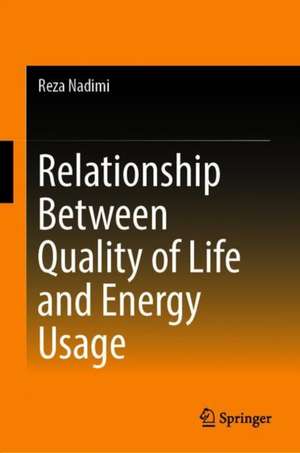Relationship Between Quality of Life and Energy Usage
Autor Reza Nadimien Limba Engleză Hardback – 29 apr 2019
In turn, the book provides general information on how to reconcile sustainable energy consumption with QoL and economic development. Optimization programming technique and simulation are applied to measure potential energy saving in each country, without sacrificing economic progress, and while maintaining QoL.
Given its scope, the book is highly recommended to the following audiences: (1) readers seeking a state-of-the-art quantitative work on energy systems and QoL; (2) manufacturers and developers of renewable energy technologies who consider renewables as an option for mitigating energy poverty; and (3) international institutions such as the United Nations seeking a sustainable global energy strategy.
Preț: 388.90 lei
Nou
Puncte Express: 583
Preț estimativ în valută:
74.45€ • 77.68$ • 62.41£
74.45€ • 77.68$ • 62.41£
Carte tipărită la comandă
Livrare economică 13-27 martie
Preluare comenzi: 021 569.72.76
Specificații
ISBN-13: 9789811378393
ISBN-10: 9811378398
Pagini: 184
Ilustrații: XVIII, 163 p. 55 illus., 54 illus. in color.
Dimensiuni: 155 x 235 mm
Greutate: 0.44 kg
Ediția:1st ed. 2019
Editura: Springer Nature Singapore
Colecția Springer
Locul publicării:Singapore, Singapore
ISBN-10: 9811378398
Pagini: 184
Ilustrații: XVIII, 163 p. 55 illus., 54 illus. in color.
Dimensiuni: 155 x 235 mm
Greutate: 0.44 kg
Ediția:1st ed. 2019
Editura: Springer Nature Singapore
Colecția Springer
Locul publicării:Singapore, Singapore
Cuprins
Chapter 1: Introduction.- Chapter 2: QoL modeling against energy consumption per capita.- Chapter 3: QoL and final energy consumption with other policy targets.- Chapter 4: Potential energy saving in the energy system via DEA technique by relying on QoL.- Chapter 5: Fundamental energy needs quantification for QoL improvement.- Chapter 6: General conclusion.
Textul de pe ultima copertă
This book utilizes statistical techniques to define a quality of life (QoL) indicator combining the three dimensions of economy, health, and education. In turn, it uses modeling to assess the impact of energy consumption on 112 countries’ QoL. What sets the proposed model apart from previous research is its ability to distinguish between pre-developing, developing, and developed countries. One important aspect of this distinction is their different global energy policies and their priorities with regard to achieving sustainable energy consumption. Accordingly, the book also discusses eco-sufficiency, eco-efficiency, and energy poverty reduction for the three different types of countries.
In turn, the book provides general information on how to reconcile sustainable energy consumption with QoL and economic development. Optimization programming technique and simulation are applied to measure potential energy saving in each country, without sacrificing economic progress, and while maintaining QoL.
Given its scope, the book is highly recommended to the following audiences: (1) readers seeking a state-of-the-art quantitative work on energy systems and QoL; (2) manufacturers and developers of renewable energy technologies who consider renewables as an option for mitigating energy poverty; and (3) international institutions such as the United Nations seeking a sustainable global energy strategy.
In turn, the book provides general information on how to reconcile sustainable energy consumption with QoL and economic development. Optimization programming technique and simulation are applied to measure potential energy saving in each country, without sacrificing economic progress, and while maintaining QoL.
Given its scope, the book is highly recommended to the following audiences: (1) readers seeking a state-of-the-art quantitative work on energy systems and QoL; (2) manufacturers and developers of renewable energy technologies who consider renewables as an option for mitigating energy poverty; and (3) international institutions such as the United Nations seeking a sustainable global energy strategy.
Caracteristici
Analyzes overall energy efficiency in terms of human quality of life (QoL) to propose a sustainable global energy strategy Measures fundamental energy needs at the household level to ascertain the energy needs and share of renewables for the poor Puts forward a QoL indicator with sustainable development goals
